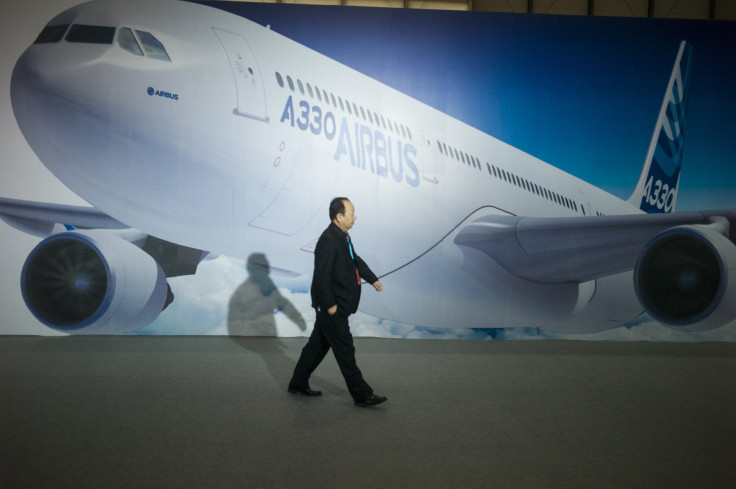Airbus Can't Take Advantage Of Boeing's 737 MAX Woes

Last week, Airbus (NASDAQOTH:EADSY) reported strong revenue and earnings growth for the first quarter of 2019, as it ramps up production of its popular A320neo-family planes. The European aerospace giant also confirmed its full-year guidance for 2019.
Nevertheless, management poured cold water on the idea that the safety concerns plaguing the Boeing (NYSE:BA) 737 MAX will lead to turbocharged growth for Airbus. First, supply-chain constraints continue to limit Airbus' production despite strong demand from airlines for its jets. Second, Airbus is still struggling to build aircraft efficiently and remains unable to match Boeing's profitability and cash flow.
Airbus sees improvement in the first quarter
During the first quarter, Airbus delivered 162 commercial jets -- up from just 121 a year earlier -- including 126 A320-family aircraft. As a result, revenue surged 24% year over year to 12.5 billion euros ($14.1 billion).
The increase in volume for Airbus' commercial aviation business drove a strong improvement in the company's earnings. (The defense and helicopters units posted relatively stable profitability for the quarter.) Adjusted operating profit reached 549 million euros ($615 million) last quarter, whereas Airbus had barely broken even a year earlier, logging a 14 million-euro ($16 million) adjusted operating profit.
Airbus reported just 62 new aircraft orders last quarter, more than offset by 120 cancellations. However, management indicated that the demand environment remains strong. The big uptick in cancellations was driven by Airbus' decision to discontinue the A380 jumbo jet and the financial woes of Etihad Airways, which had to scale back its order commitments.
Production problems aren't going away entirely
In recent years, delays at critical suppliers have repeatedly interfered with Airbus' efforts to boost production of its popular A320-family jets. Fortunately, these supply-chain constraints have started to ease over the past year.
Nevertheless, there is very little slack in the system. Airbus executives said that even though Boeing has temporarily reduced production of the 737 MAX due to the grounding of that aircraft type, this doesn't open up an opportunity to further increase A320-family production. While some suppliers serve both aircraft manufacturers, others don't participate in the Boeing 737 MAX program and are still working flat out to meet their existing commitments to Airbus.
Additionally, Airbus has been having trouble on its production lines over the past year due to the introduction of its new "Cabin-Flex" configuration for the A321neo.
The net result is that Airbus isn't in a position to commit to new production increases right now. The company is in the midst of boosting A320-family output to a rate of 60 per month, and it already plans to reach a rate of 63 per month in 2021. Even at that rate, it would take more than eight years to work through the current backlog. Yet management remains firm that Airbus can't move to a production rate higher than 63 per month until after 2021.
Financial performance continues to lag Boeing
Given that Boeing was forced to halt 737 MAX deliveries cold turkey in mid-March, one might have expected it to trail Airbus dramatically in terms of financial performance last quarter. That couldn't have been further from the truth.
Boeing reported revenue of $22.9 billion last quarter and a core operating profit of nearly $2 billion: more than triple that of Airbus. Moreover, while Boeing's free cash flow slid 17% year over year to $2.3 billion, Airbus burned 4.3 billion euros ($4.9 billion) of cash last quarter.
Airbus' low profitability and cash burn are the two most visible effects of its ongoing production issues. The 162 aircraft delivered last quarter represent just 18% of Airbus' planned deliveries for the full year, so there was a buildup of inventory last quarter that weighed on cash flow in particular. This has been a recurring theme at Airbus for many years: A disproportionate number of jets are delivered in December, generating most of the company's annual free cash flow.
Management realizes that this is unsustainable. That's perhaps the biggest reason why Airbus can't consider boosting production to gain market share from Boeing anytime soon. To achieve acceptable financial results, Airbus must fix its internal production issues so that it can deliver jets at a steady pace throughout the year. Hopefully, a few years of roughly stable production will allow it to fix this long-standing problem so that Airbus can go back on offense in the future.
Adam Levine-Weinberg has no position in any of the stocks mentioned. The Motley Fool has no position in any of the stocks mentioned. The Motley Fool has a disclosure policy.
This article originally appeared in The Motley Fool.




















